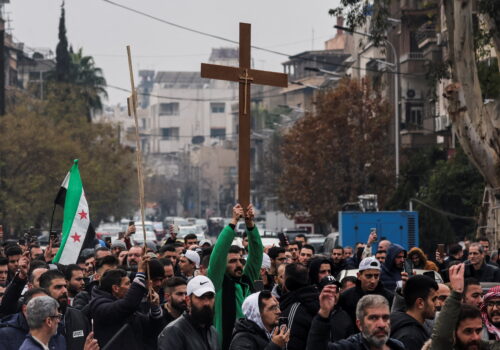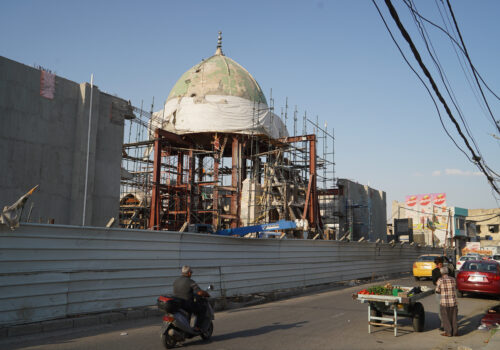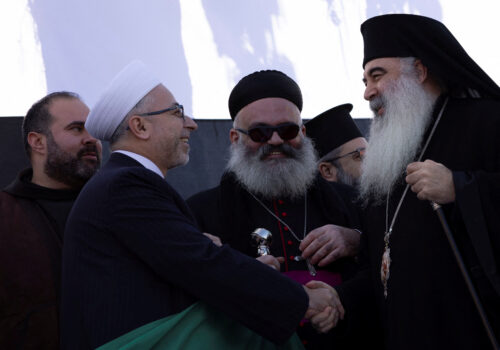Will Pope Francis’s Middle East legacy endure?
The word catholic, derived from the Greek katholikos for “universal,” felt profoundly relevant this week with the passing of Pope Francis after twelve years as the Roman pontiff. Indeed, his death at the age of 88 has united Christians and non-Christians across the world in grief after a consequential pontificate that saw a liberal pastoral approach, moderate liturgical reforms, and a commitment to peace and the poor.
The Middle East holds particular importance in that legacy—the region is at the center of Pope Jorge Mario Bergoglio’s final and most public sermons and pastoral acts.
Understandably, many have focused on his policy and posture toward the state of Israel.
His final address on Easter Sunday was a capstone in a track record of advocacy for peace between the Israelis and Palestinians, including strong and direct statements. “Dramatic and deplorable” is how he described the living conditions in Gaza. The brutal massacre of the Palestinian population in the Gaza Strip by the Israeli Defense Forces, which came almost at the conclusion of his Pontificate, had quite publicly saddened and pained him in a deep way.
Pundits and commentators have been quick in pointing out the silence coming from the office of Israeli Prime Minister Benjamin Netanyahu since his death. President Isaac Herzog delivered a few comments, nice and positive, even if not particularly warm. The relationship between the first modern non-European Pope and the state of Israel has been contentious indeed.
The vocal standing behind the Palestinian plight—including multiple sermons on Gaza and near-daily calls with Gaza’s Christian leaders through the war—was the success of Franciscan values over a part of the Catholic Church which would have preferred a more nuanced, if not entirely favorable, position towards Israel.
SIGN UP FOR THIS WEEK IN THE MIDEAST NEWSLETTER
Further, influential personalities like Monsignor Pierbattista Pizzaballa, the patriarch of Jerusalem, who offered himself in exchange for Hamas’s Israeli hostages in the aftermath of October 7, are a living testament to Pope Francis’ posture of opposition to the occupation of the Arab lands in Palestine.
But his legacy in the Middle East extends beyond Palestine. Bergoglio exerted influence in quite a few areas across the region.
Pope Francis exercised pressure on the European powers regarding the tragedy of the civil war in Syria and the horrors unleashed by the Islamic State. The concurrent efforts by the Church to protect and save as many members of the Church of the Levant as possible are noticeable and much appreciated—albeit not always successful.
In the wider Levant, his stance was coherently against the extremists of the Islamic State, the Islamists of the Muslim Brotherhood and other similar organizations—whom he always saw as a danger to his vision of brotherly intent to take care of the world’s marginalized.
He was widely liked in the Emirates, with whom Pope Bergoglio understood the importance of positive relationships despite the abysmal record of the small emirates confederation in human rights and respect for pluralism. He understood the potential for success in diplomacy, negotiation, and public support that could arise for the Church if it sided with the Emiratis and their projection of growing global influence.
To summarize, Pope Francis’ policy in the Middle East and North Africa has been characterized by a wise combination of value-based policies and convenient stances, in line with the scope of the objectives the Pope set for his pastoral mission.
However, the region is very diverse: ethnically, socially, culturally, and, obviously, religiously. This diversity—despite the frequent skirmishes and conflicts it has played a hand in sowing—has always been understood as the wealth of the region. Trying to find a common denominator in reactions to Pope Francis’s policies, let alone the expectations of the new Pontiff, is difficult to define without risk of distorting the varied perspectives from the diverse threads of the region’s canopy.
It is possible to say that, at the popular level, the importance of the Catholic Pope is not as significant as in other parts of the world. After all, there are very few Catholics left in the Middle East.
Moving forward, answering the question of who constitutes the ruling elites of the Middle East—namely, those who hold political power and, in some cases, represent religious authority—is crucial to understanding regional expectations of the new Pope.
For the region’s ruling elites, the Church’s spiritual component matters less, and its influence holds significance only as a political force. In this respect, the Church and its 2.2 billion followers become a heavyweight geopolitical actor, and as such, they treat it.
And there are indeed secular movements at play, particularly with respect to a growing conservatism among Catholics in Western world powers like the United States.
In the West, there is an ascent of right-wing movements that Pope Francis fiercely fought against, including populism, Islamophobia, and xenophobia. But these emerging movements may be more in line with some of the region’s ruling powers.
Regional leaders, building on alliances with the new administration in Washington, for example, may indeed hope for the election of a conservative Pope, who could become an ally in maintaining and defending the values that Middle Eastern elites share with conservatives in the West.
Karim Mezran is the director of the North Africa Initiative and resident senior fellow with the Rafik Hariri Center and Middle East Programs at the Atlantic Council, focusing on the processes of change in North Africa.
Further reading
Wed, Mar 19, 2025
Inside Hayat Tahrir al-Sham’s diplomatic offensive with Syria’s Christians and Ismailis
MENASource By
HTS’s diplomatic offensive demonstrates the leadership’s political approach, which evolved over years of engaging with the Christian and Druze communities in Idlib.
Mon, Jun 10, 2024
ISIS fell, but the conditions that created the terrorist group still exist in Iraq
MENASource By Abbas Kadhim
The pervasive culture of corruption and a poor economy have been among the leading conditions that contributed to the rise of ISIS in Iraq.
Fri, Dec 20, 2024
What will minority and women’s rights look like in the new Syria?
MENASource By Sinan Hatahet
After years of conflict and division, there is an opportunity to build a more inclusive and just future that reflects the resilience, diversity, and aspirations of all Syrians.
Image: Pope Francis reacts as he arrives to pray for war victims at 'Hosh al-Bieaa', Church Square, in Mosul's old city, Iraq, March 7, 2021. REUTERS/Yara Nardi


